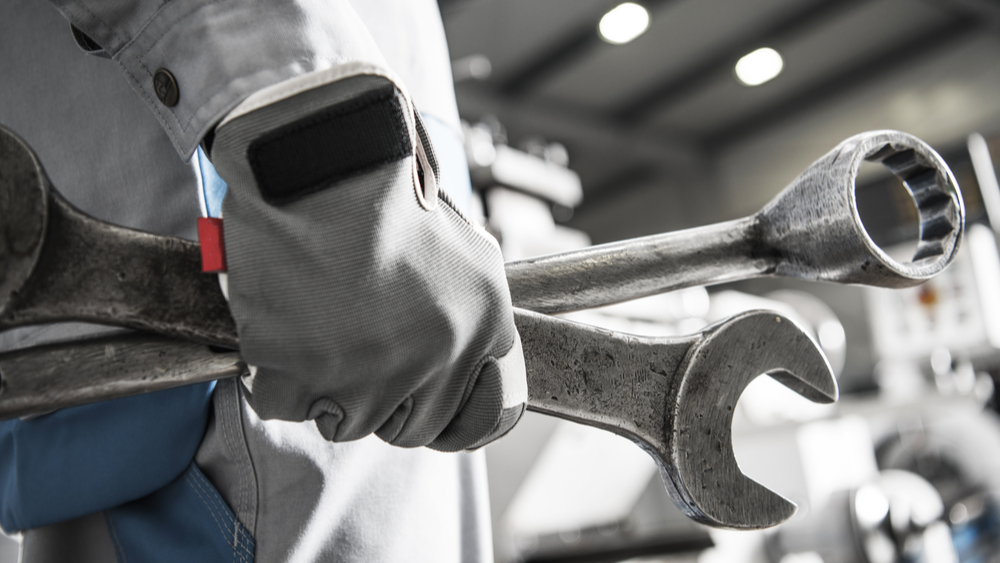When do I need a service contract?
Unplanned downtime will cost any business considerably. While most plants cannot pinpoint the exact loss figures, data from the US predicted it to be as much as $260,000 an hour for some companies. That’s not to mention the impact of loss of time and resources, as well as the effect on reputation.
It’s therefore crucial that unplanned downtime is avoided where possible. This means ensuring any downtime that does occur is planned and used to keep your production line working in optimal condition. You can do this by scheduling time for preventive maintenance and ensuring that the required repairs are dealt with promptly and effectively.

When seeking to reduce downtime and maintain your equipment, it may be tempting to limit costs by doing it yourself. However, having an external maintenance service contract can be a valuable investment, giving you the expertise you need to protect your machines and access efficient fixes quickly.
This guide explores the roles of a service contract versus internal repairs, including when you might utilise each in your plant and what approach to take to get the best value for money – while successfully handling faults and reducing downtime.
- Why does machine maintenance matter?
- When do I need a service contract versus internal repairs?
- What do I need for my plant?
Why does machine maintenance matter?
Machine maintenance is essential in manufacturing. You will use your machinery every day as part of your operations, so you need it to be in excellent working order.
If part of the production line were to fail, it could lead to loss of time and resource as well as failure to meet deadlines which could have repercussions for other tasks and your reputation. It will also increase your expenses with added waste through product giveaway and additional supplies (at cost to your business) required to reprocess faulty lines.
Another issue is the quality of your output. If equipment is not up to standard, substandard produce may be missed, or programmes will not run as expected, which will compromise your end product. It could even lead to contamination from broken parts, causing consumers harm. There may also be safety implications for your staff who are subject to malfunctioning systems.

By having a product maintenance schedule, you will prevent worse problems arising by catching faults early. This makes the chance of a severe failure or outage in your production line less likely, which were it to occur would lead to a costly repair and hours of unplanned downtime.
If you implement a maintenance schedule, you will instead focus on maximising productivity across your plant, allowing you to consistently meet deadlines, improve turnaround times and increase the quality of your output. It will also enable any fixes to be dealt with faster, so any unexpected downtime is minimised.
When do I need a service contract versus internal repairs?
There are two options for handling maintenance and repairs in your plant: an external supplied service and maintenance contract or deliver the same via your own staff.
You can take out a contract with an external provider, at a cost to your business. This will come with regular visits to review and maintain your equipment, as well as call outs to an engineer when an urgent fix is required.
With internally delivered maintenance, you will need to recruit and train internal resources to handle your repairs. You will also need to schedule regular equipment checks to keep up to date with maintenance and catch issues early on.
There are pros and cons to each. An external engineer will be highly skilled to work with the equipment in your plant, saving you time and money from having to train up your own employees. In most cases, they come directly from your machine supplier, so will have a deep understanding of how each system works in numerous environments. This means you are confident your machinery is being maintained correctly to create optimal conditions across your plant. It will cause any repairs undertaken to be long-lasting and accurate, as well as maintaining the integrity of any manufacturer warranties and compliance with the different customers’ codes.

As we have already mentioned, external service contracts will come at a cost. For this reason, many manufacturers may be tempted to carry out maintenance and repairs themselves where possible.
Internal maintenance and repairs could save time and money, provided that you have the skills and tools you need to carry out the work. If a system were to break, an in-house repair could happen faster than waiting for an engineer visit, limiting downtime and getting production moving again swiftly.
During the coronavirus pandemic, where visitors to site had to be limited, being able to carry out repairs internally proved to be essential for some plants.
However, if you carry out your own maintenance or repairs, you need to ensure the staff member undertaking the role is sufficiently trained and understands how to conduct checks. Some machine manufacturers may provide support in the form of a helpline or instruction guides that enable an adequate repair, even for unskilled workers.
If you have machinery that needs fixing, you need to ensure that you a supply of parts for the repair. This means having effective spare parts management to build an inventory of the items you need. This will make the ongoing maintenance of your production line easier, enabling you to replace parts as required for maximum efficiency.
Carrying out the repairs has its benefits, but it is important that you ensure that you do not invalidate manufacturer’s warranties or the standards that are required for your customers, which will have been set up by the manufacturer when the equipment was installed.
When choosing between an externally sourced maintenance service contract versus an internal team to carry out the same role, it is a matter of the issue at hand. It’s sensible to carry out some work in-house, as this can enable faster repairs and give you some control when an engineer is unavailable. However, this will generally apply to straightforward maintenance and fixes.
For more complicated issues, you will benefit from having a highly skilled, external engineer who knows your machinery and environment well. This will ensure that your production line is working as intended, without causing further problems for your plant later down the line. It’s critical to carry out regular maintenance and repairs on all your machinery regardless of which approach you choose.
In this sense, a combined approach of external support and internal resource is recommended, allowing you to find a solution for any situation that may arise in your plant and reduce any loss to productivity that follows.
What do I need for my plant?
In order to empower effective maintenance and repairs, you need to create the right conditions in your plant, including access to skills and resources.
For external maintenance supply, you need to agree to a contract with a reputable provider. In most cases, this is best sourced directly from your machinery supplier, as they will have the most knowledge about their products. It is possible to add in a maintenance contract when you first purchase the equipment.

Remember to make a note of any emergency numbers given under the contract so you know who to call if you have a failure during production.
If you wish to deliver maintenance and repairs through your own team, you will need to create a regular maintenance schedule that includes checks of all parts of the production line. It’s also essential to appoint someone to be responsible for this and make sure they receive enough training to know what to look for.
You will need to build an inventory of spare parts that enable you to conduct repairs as required. These parts should be provided by the machine supplier, so you can ensure they are genuine and will provide a resilient fix.
If you identify an issue that cannot be fixed in-house, having a maintenance agreement in place to support your site team will be crucial and allow you to contact a trained engineer as soon as possible.
Conclusion
It’s understandable why some manufacturers may choose to go it alone when undertaking maintenance and repairs. However, having a service contract can be a critical in case of more complex problems which may arise in your plant, helping you to reduce the impact and focus on creating the best possible conditions for production.
It is important that you create a good approach to maintenance that enables you to handle any issues promptly and correctly, whether through a contract, effective spare parts management or a hybrid. This will reduce the need for frequent unscheduled repairs and make the process simpler when they are required. The benefit will be ongoing productivity and improved output quality, which will also save you money in the long run.
At Yamato, we are here to help you keep your production lines running efficiently. We can provide support across our entire product range , including maintenance contracts and our skilled engineers are ready to rectify any issues you may have.
We hold a large inventory of spare parts on all our solutions which are dispatched the same day. Our bucket repair kits provide a quick and easy long term solution to repairing multihead weighers on your line, giving you all the tools you need to carry out a robust fix.
Get in touch today to find out more.

